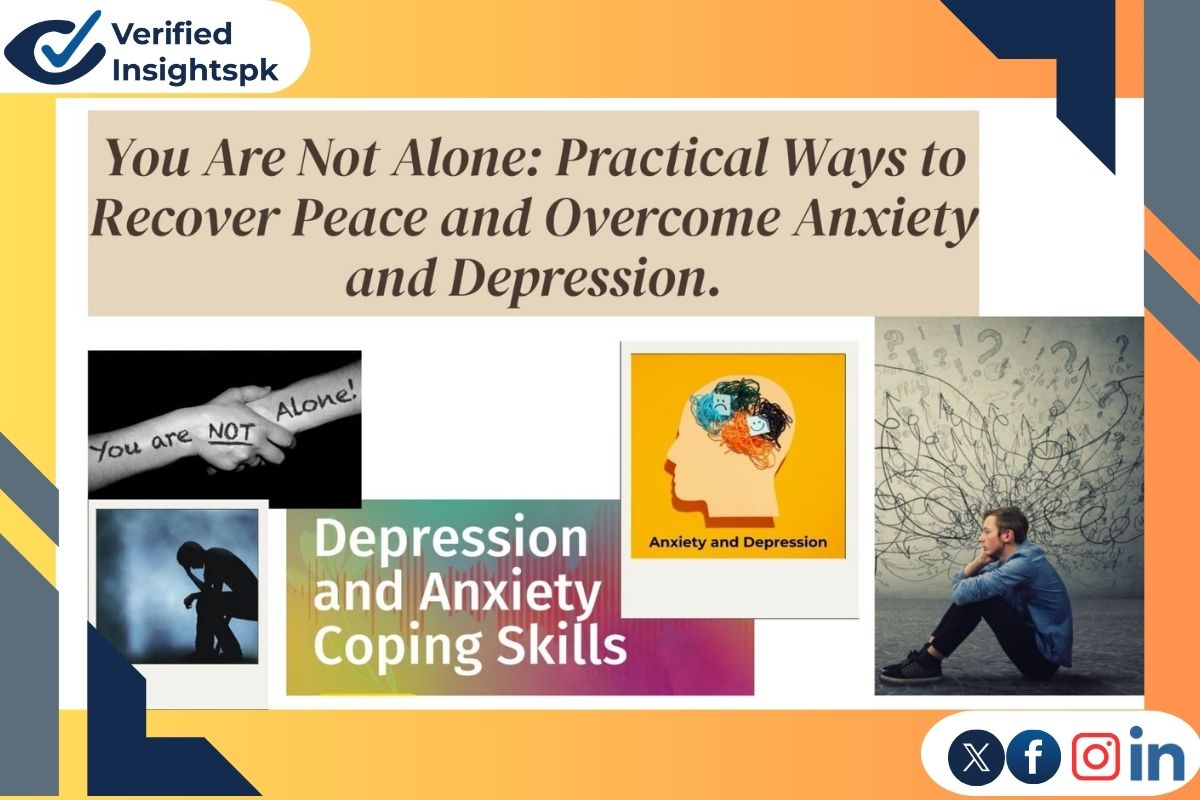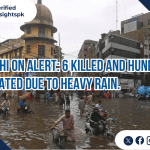
Practical Ways to Recover Peace and Overcome Anxiety and Depression
In today’s fast-paced world, anxiety and depression have become common problems. Millions of people in the world feel tiredness, sadness and worries all the time. But remember, you are not alone. These feelings don’t mean you are weak; they show you are human. The best part is that you can heal and find peace with the right help and right habits.
So, you are not alone. In this guide, we will help you understand and overcome Anxiety and Depression and let you restore your inner peace. Let’s move ahead!
What are Anxiety and Depression, and How Can You Overcome Anxiety and Depression
The good news is you are not alone, and the problem, “Anxiety and Depression”, is easily solvable. There are a few things you need to add to your routine, and then see the magic happen. But it is very obvious that “Good things work for those who desire good” It is very important how you help yourself to beat this distracting Anxiety and Depression. Are you ready? So here we go!
Understanding of anxiety and depression
Before starting anything, it is essential to understand what anxiety and depression really mean. We are breacking down everything into very simple terms to give more understanding.
Anxiety and depression are two of the most common mental health challenges people face today. Though they often appear together, they are not the same.
Anxiety
Anxiety is your body’s normal reaction to stress, fear, and worry about the future. Feeling anxious in some situations is normal, but when it becomes a constant practice, it is abnormal. Common signs are a fast heartbeat, focus issues, worry, and restlessness.
Depression
In depression, the feeling of sadness is not temporary or for a short period of time. It brings a permanent feeling of hopelessness, tiredness and fatigue; you do not enjoy things anymore that you once enjoyed. It changes your thoughts negatively, changes your sleep pattern, and your appetite, which directly affect your physical health.
Both these conditions overlap. Sometimes anxiety causes depression, and sometimes depression causes anxiety. The first step toward recovery is that you can recognize your symptoms.
Common Symptoms of Anxiety and Depression
- Constant fear or nervousness
- Trouble sleeping or concentrating
- Feeling sad or empty most of the day
- Irritability and low energy
- Loss of interest in hobbies or social life
- Physical symptoms such as headaches, fatigue, or stomach issues
If you are unsure what you are experiencing, taking an Anxiety and Depression test online can help you identify signs early and decide if you need professional help.
You are never alone in this journey
It is normal to believe that no one can understand what is going on with you, but statistical study shows. According to the World Health Organization (WHO), over 3 million people suffer from depression, and 280 million people experience anxiety worldwide. These numbers show that many populations are facing mental health problems.
Talking about your problems makes you brave. Share things with your trusted friend, family members and professionals. It helps you to break the isolation that is due to depression and anxiety.
Remember one thing: help is always available, and recovery starts with building connections.
Simple ways to restore your inner peace
Finding peace while suffering from anxiety and depression seems impossible. But here are some practical tips through which you can make changes. Some evidence-based tips that help you regain your peace.
Mindfulness and meditation
Mindfulness and meditation are the best ways to manage anxiety and depression. It helps you to notice your thoughts and relax and calm your behaviour.
Here are some tips:
- Do 5- 10 minutes of meditation each day.
- Focus on your breathing and the gentle sounds around you.
- Focus on your thoughts, but do not judge them.
- Over time, mindfulness helps you control your thoughts.
- You can use helpful apps like Calm, Headspace and Insight Timer for this.
Best Exercises To Overcome Anxiety and Depression
Exercise is a natural way of reducing stress and mood. It releases a chemical called endorphin in your body that helps you to feel good. Here are some small steps that make a difference.
- Take 20 20-minute walk daily.
- Try exercises like yoga, stretching and simple exercises.
- Dance to your favourite music.
- Be consistent
- Regular activities tell your mind and body that you are healing and becoming strong.
Improve a Healthy sleep pattern
Bad sleeping patterns and lack of sleep worsen anxiety and depression. Make a healthy sleep pattern; avoid screens before bed; instead, you can read a book or novel, and listen to soothing music for better sleep. Make your bedroom a peaceful place for sleep. Good sleep is not a luxury; it is an important part of life and for recovery as well.
Nourish your mind and body
Nutrition can boost our mental health. Vitamins D and B, omega-3 fatty acids, magnesium and antioxidants support brain functions and emotional well-being. Avoid sugar and caffeine to avoid anxiety and mood swings.
Use food that fuels your mind and body and stabilizes your everyday mood.
Make connections
Isolation led to depression. Make connections with people, make friends, and talk with your family members. Sharing your insecurities can make you powerful and strong enough to deal with them.
“Healing takes time, and asking for help is a courageous step.” — (Mariska Hargitay).
If you are struggling to make connections, seek help from professionals, counsellors and psychologists. Professionals give tools and techniques to deal with all these things.
Be kind to yourself
Many people who are suffering from depression and anxiety are their biggest critics. Learn to treat yourself with kindness. Recovery from anything is not an easy thing; you need to tell yourself that you want to recover.
It is very normal to have a good and sometimes a bad day. Use simple affirmations like: “I’m doing my best” or “I deserve peace and healing”. This thing helps you to love yourself more.
Discovering hope in healing
Healing from anxiety and depression takes a lot of time. But every step you take in the way of recovery matters. Care for yourself, think kindly, and reach for professional help to take you closer to your recovery.
Remember, you are not alone; millions of people are facing this and recovering from this. Choose peace for yourself, and recovery is possible for everything.
“Even the darkest night will end, and the sun will rise.” — (Victor Hugo).
FAQs About Anxiety and Depression
Can Anxiety Cause Depression?
Yes, anxiety can sometimes lead to depression. When a person lives with ongoing stress or fear for a long time, it can drain emotional energy and trigger feelings of sadness or hopelessness. This overlap is why doctors often treat anxiety disorders and depression together.
How to Fix Anxiety and Depression
There is no single solution that works for everyone, but several treatments have been proven effective:
- Medication
Doctors may prescribe anxiety and depression medication, such as SSRIs, to help balance brain chemicals.
- Therapy
Cognitive Behavioural Therapy (CBT) teaches coping strategies and positive thought patterns.
- Lifestyle changes
Regular exercise, balanced meals, enough sleep, and mindfulness can all help reduce symptoms.
- Support groups
Talking with others who understand your experience can be very healing.
If you are struggling, reach out to a licensed therapist or doctor for guidance. Early treatment for anxiety and depression can make recovery easier.
Are There Signs of Anxiety and Depression
There are Five Common Signs You Might Have Anxiety:
- You often feel restless or on edge.
- You worry too much about everyday situations.
- Your heart races or you feel breathless for no clear reason.
- You find it hard to concentrate or relax.
- You struggle to control your thoughts or fears.
If several of these signs sound familiar, it may be time to talk to a mental health professional.
What Is the #1 Worst Habit for Anxiety?
One of the worst habits for anxiety is overthinking. Constantly replaying problems or fearing the worst can intensify anxiety symptoms. Learning to let go of negative thought patterns through mindfulness or therapy can greatly reduce stress.
Final Thoughts
Whether you face mild worry or severe depression, remember that both are treatable conditions. You do not have to face them alone; reach out to a trusted doctor, counsellor, or support line. Seeking help is a sign of strength, not weakness.
We hope that you found this guide helpful. Reach out to us if you have anything to say. We would love to hear from you.
Don’t forget your mental health matters, and recovery is always possible!










